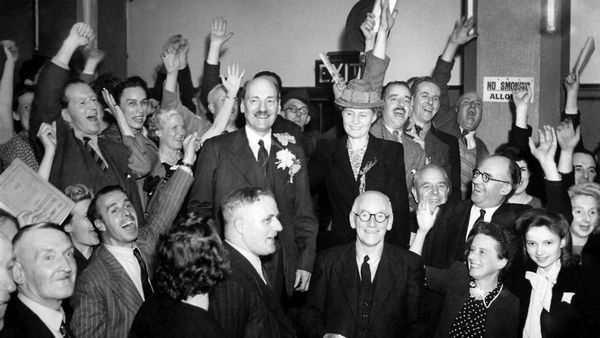Labour landslides: then and now
 It was to no one’s surprise that a Labour government was elected in 2024. The Tory administration was falling apart, the opinion polls were deafening, and Labour presented itself as ready to take over. On the other hand, it was to everyone’s surprise that a Labour government was elected in 1945. Britain was one of the allied powers that had defeated Hitler with its highly popular Conservative prime minister ready to continue in office, there were no opinion polls to take into account, and the only experience the Labour Party had previously had of power was brief and bitter. And yet, in the July 1945 election, what happened would nowadays be called a landslide – for Labour. Can what happened to Labour then and in the years that followed be compared to what is happening to it now and may happen in the future?
It was to no one’s surprise that a Labour government was elected in 2024. The Tory administration was falling apart, the opinion polls were deafening, and Labour presented itself as ready to take over. On the other hand, it was to everyone’s surprise that a Labour government was elected in 1945. Britain was one of the allied powers that had defeated Hitler with its highly popular Conservative prime minister ready to continue in office, there were no opinion polls to take into account, and the only experience the Labour Party had previously had of power was brief and bitter. And yet, in the July 1945 election, what happened would nowadays be called a landslide – for Labour. Can what happened to Labour then and in the years that followed be compared to what is happening to it now and may happen in the future?
Welfare state
It is often said that Labour’s triumph in 1945 shocked its leader, Clement Attlee, who claimed that he had seen reducing the Conservative majority as his best hope. But rather than depending on the views or hopes of political leaders, election results, as has often been demonstrated, hinge more on what has been called ‘a readiness for change’ among the electorate. And this is the likely explanation here. The report drawn up by the Liberal Party’s Sir William Beveridge in 1942 proposed what it called ‘social insurance’ for the British population, a plan for the state to provide social security (eg, sickness and unemployment pay, old-age pensions, free healthcare) for everyone. This was followed in 1944 by a government committee recommending the nationalisation of services such as gas and electricity.
The Labour Party was enthusiastic about the programme, calling it a new ‘welfare state’, while the Conservatives were lukewarm. And this may well have been the main driver of the electorate’s preference for Labour. The way George Orwell put it, in an article published in late 1945, was that Labour had seized an opportunity it did not create. At the same time Orwell expressed doubt that Labour would end up delivering on all of its manifesto, which proclaimed:
‘The Labour Party is a Socialist Party, and proud of it. Its ultimate purpose at home is the establishment of the Socialist Commonwealth of Great Britain—free, democratic, efficient, progressive, public-spirited, its material resources organized in the service of the British people.’
What then happened when Labour came to power is a matter of historical record. Coal, gas, electricity, iron and steel, railways, civil aviation, telecommunications and the Bank of England were nationalised with full compensation to their previous owners.
General state benefits for the unemployed, sick and aged were brought in. A National Health Service was established supplying health care free of charge with staff at hospitals becoming government employees. There is no doubt that these represented significantly beneficial change for the vast majority of British workers.
However, even though the Labour Party had proclaimed itself to be ‘a Socialist Party’, this was certainly not socialism in the sense we understand it as a society of free access to all goods and services. In fact Labour now in office made no attempt to challenge the existing social order of capitalism, whereby the vast majority of the wealth was owned by a tiny minority and production and distribution of the means of life took place on the basis of profit rather than need. What it sought to do in fact was to make that order more secure by suggesting to workers that, via nationalisation, they had more of a stake in it and that, with ‘social security’, protest and challenge to the existing system were unnecessary since, whatever their circumstances, they could rely on being looked after ‘from the cradle to the grave’.
Downhill
In reality the unspoken rationale of Labour’s ‘welfare state’ was to try to make production more efficient and more cost effective by the state having more control over it and to remove unnecessary hindrances to workers’ productivity by trying to create a more benign form of capitalism. Yet none of this could prevent the usual crises that beset the market system from presenting themselves. After an initial ‘honeymoon’ period, prices began to rise causing workers to press for wage increases and to industrial unrest. Labour’s response was a policy of ‘wage restraint’, which brought it into collision with striking workers, leading, for example, to the use of troops to replace dockers for unloading ships.
Later things went further downhill when there was a financial crisis and a run on the pound led to devaluation and further price rises. And, with the ‘free’ health service becoming unpredictably expensive, plans were made for charges to be brought in for prescriptions as well as for NHS dentures and spectacles. As it all unravelled, it became increasingly clear, if it had not been already, that no Party committed to running the buying and selling system of capitalism in any form could adjust it to work in the interests of the majority class in society, those obliged to sell their energies to an employer for a wage or salary in order to survive. Yet this was evidently not clear enough to most members of that majority class – the working class – when in 1951, if with no great enthusiasm, they voted capitalism’s other team, the Tories, back into office. Never more than on that occasion did the words of the old socialist dictum ring true: ‘Governments are not elected, they are dismissed’.
 Landslide to where?
Landslide to where?
That’s something that can also be said of the outcome of this year’s election. No one would claim that that there was any great love among the electorate for Keir Starmer and his Labour Party, yet this time too, as in 1945, Labour gained a landslide victory over the outgoing Tories. What this showed is that, as ever in capitalism, governments – in this case the Tories – do not control the system they are meant to manage. The system, or to be more specific, the market, which is its beating heart, has a mind of its own, an unpredictable one, and all governments can do is tinker at its edges and hope that somehow such tinkering will keep the pieces in place. If they try anything too drastic, it is very likely to make the situation worse, as Prime Minister Truss found to her – and her party’s – cost just a short time ago.
So how is Starmer who, like his Labour counterparts did in 1945, has called himself a socialist, planning to tinker? His election manifesto, ‘Our Plan to Change Britain’, held out such promises as ‘a rebuilding of our country, so that it once again serves the interests of working people’, ‘to drag my Party away from the dead end of gesture politics and return it once more to the service of working people’, and ‘to kickstart economic growth by reforming Britain’s economy’. It’s obviously quite unclear what all this means – if anything. But in stating that ‘the economy is about things like money, businesses and buying and selling things’, it is clear what kind of society he’s wedded to.
And what does another of his promises, to ‘focus on long-term strategy, not short-term distractions’, mean? How, in fact, in the hurly-burly of capitalist politics, can any party focus on much more than ‘short-term distractions’? After just a few weeks in power, in fact, Labour are already finding themselves having to face a whole cluster of ‘short-term distractions’ – race riots and a dearth of places for offenders in prisons already full to bursting, a potential ‘run on the pound’ leading them to scrap the winter fuel allowance for pensioners who may already struggle to put the heating on, and cash-strapped universities on the verge of bankruptcy. They’re blaming the previous Tory administration for leaving ‘a black hole in the economy’, and they’re saying, despite all the fine rhetoric in their manifesto, that ‘things will get worse before they get better’ and that we must ’accept short-term pain for long-term good’. They are clearly not about to have the same ‘honeymoon’ period’ as their counterparts in the 1940s.
Alternative team
So how do the two Labour governments – the 1945 one and the 2024 one – compare? The earlier one came to office in the shadow of the 1930s’ economic depression and then six years of war, and so virtually any steps it took were perceived as representing more stability and security than Britain’s workers previously had. But after 3-4 years of what has been called ‘rebuilding space’, the reality of capitalism’s priorities set in and led to it losing the favour of the electorate and being dismissed from office in 1951. The current Labour government, as we have seen, seems to be running into trouble more quickly than its post-war predecessor, again under the pressures of needing to give priority to profit-making over meeting people’s needs. Yet it would be premature to predict that it will be less or more long-lived than the 1945 government, since we cannot foresee the precise effects that the twists and turns of the market system will have on the alternative team for managing British capitalism that is currently in office.
HKM
